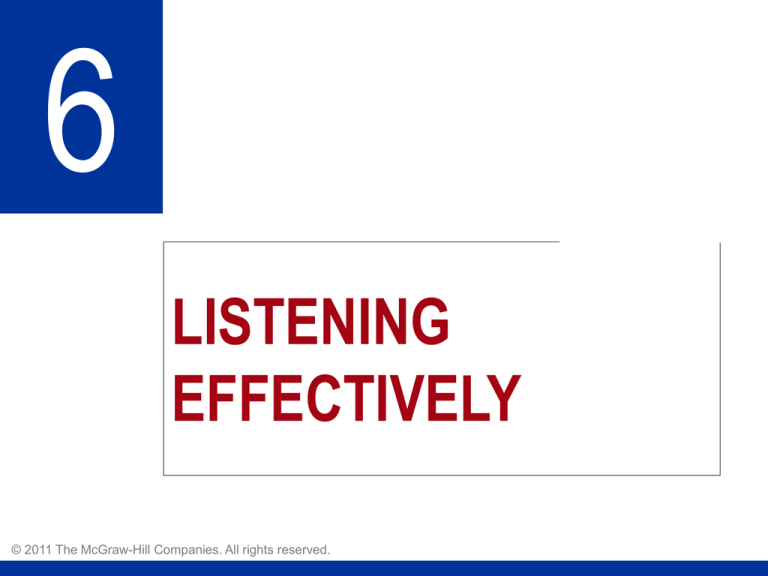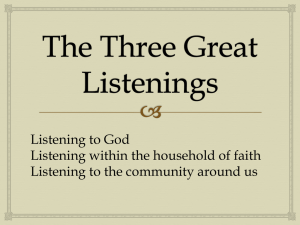
6
LISTENING
EFFECTIVELY
© 2011 The McGraw-Hill Companies. All rights reserved.
[What’s To Come
» What It Means to Listen
» Ways of Listening
» Common Barriers to Effective Listening
» Honing Your Listening Skills
[What It Means to Listen
» Listening is the active process of making
meaning out of another person’s spoken
message
• Listening is active, not automatic
• Listening requires more than just hearing,
which is the sensory process of receiving
and perceiving sounds
[What It Means to Listen
» Listening effectively is
important
• We spend much of our
waking day listening
• Good listening skills
are essential in the
workplace, families,
and social
relationships
[What It Means to Listen
» Two misconceptions
about listening are
common
• Myth: Hearing is the
same as listening
• Myth: Listening is
natural and effortless
[What It Means to Listen
» Culture can affect
many dimensions of
listening behavior
• Expectations for
directness
• Nonverbal listening
responses
• Understanding of
language
[Ways of Listening
» HURIER model of effective listening
•
•
•
•
•
•
Hearing
Understanding
Remembering
Interpreting
Evaluating
Responding
[Ways of Listening
» People often
engage in one or
more of the
following types of
listening
• Informational
listening
• Critical listening
• Empathic listening
[Ways of Listening
» Informational listening means listening to
learn
• We engage in informational listening when
taking notes in class, watching the news, or
paying attention to driving directions
• Informational listening is a relatively passive
process
[Ways of Listening
» Critical listening means listening to evaluate
or analyze something
• We engage in critical listening when we pay
attention to a commercial to see whether we
want to buy a product
• Critical listening doesn’t necessarily mean
criticizing what we’re hearing; rather, it means
evaluating what we’re hearing
[Ways of Listening
» Empathic listening means trying to
understand what the speaker is thinking or
feeling
• Perspective taking helps us understand a
situation from another’s point of view
• Empathic concern is the ability to identify how
someone is feeling and to experience those
feelings ourselves
Common Barriers to Effective
Listening
[
» Noise is a barrier to
effective listening
• Noise is anything that
distracts us from
listening to what we
wish to listen to
• Some noise is physical
• Some noise is
psychological
Common Barriers to Effective
Listening
[
» Pseudolistening and selective attention are
barriers to effective listening
• Pseudolistening means pretending to pay
attention to someone
• Selective listening means
listening only to hear
what we want to hear
Common Barriers to Effective
Listening
[
» Pseudolistening and selective attention are
barriers to effective listening
• Pseudolistening means pretending to pay
attention to someone
• Selective listening means
listening only to hear
what we want to hear
“Yea, dad. Uh, huh.”
Common Barriers to Effective
Listening
[
Common Barriers to Effective
Listening
[
» Information overload is a barrier to effective
listening
• We are exposed to multiple messages daily
• It can be difficult to pay attention to particular
messages when we have to process so many
Common Barriers to Effective
Listening
[
» Glazing over is a barrier to effective listening
• People speak more slowly than we can listen,
so our minds can wander when we listen to
others
• Glazing over can cause us to miss important
details, listen uncritically, and make it appear as
though we aren’t listening
Common Barriers to Effective
Listening
[
» Rebuttal tendency is a barrier to effective
listening
• Rebuttal tendency means debating a speaker’s
point and formulating a reply while the person is
still speaking
• Rebuttal tendency requires mental energy that
should be spent listening and can cause us to
miss details
Common Barriers to Effective
Listening
[
» Competitive
interrupting is a barrier
to effective listening
• Competitive
interrupting means
using interruptions to
take control of a
conversation
• Most interruptions are
not competitive
Common Barriers to Effective
Listening
[
» Closed-mindedness is a barrier to effective
listening
• Closed-mindedness is the tendency not to
listening to anything with which you disagree
• Many people are closed-minded only about
certain issues, not about everything
[Honing Your Listening Skills
» Becoming a better informational listener
• Separate what is and isn’t said
» Ask questions that provides clarity, if needed
• Avoid the confirmation bias
» Don’t discount an opinion outright. Listen!
• Listen for substance more than style
» Try to avoid the “vividness effect” where dramatic or
shocking events distort our perceptions of reality
(ie. post-Sept 11, 2001; post Columbine)
[Honing Your Listening Skills
» Becoming a better critical listener
• Be a skeptic
• Evaluate a speaker’s credibility
• Understand probability
[Honing Your Listening Skills
» Becoming a better
empathic listener
• Listen
nonjudgmentally
• Acknowledge
feelings
• Communicate
support nonverbally
[For Review
» What does it mean to listen effectively?
» Why is listening effectively so challenging?
» How can you improve your listening skills?





